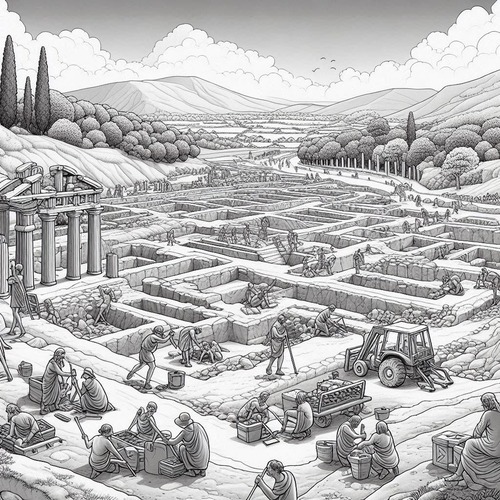Bible ‘Contradictions’: Not Quite Hurdles to Faith
Not Quite the Hurdles to Faith They’re Made Out to Be
New believers and seekers often point to perceived contradictions in the Bible as presenting major obstacles to faith. Sceptics often wield these seeming discrepancies as decisive proof the scriptures are flawed, unreliable human writings—rather than the inspired word of God. However, a closer examination from a literary and historical perspective reveals most of these variations appear to be contradictions because our modern mindset fails to account for ancient literary devices, cultural contexts, and the complexities of transmitting hand-copied texts over millennia. Far from being indefensible plot holes, these tensions can provide opportunities to gain deeper insight into the Bible’s multi-faceted layers of meaning. While some variations are difficult to fully resolve with available knowledge, faithful respondents will affirm even the most serious contradictions don’t undermine scripture’s core truth or its divine inspiration.
Consider, for instance, how these 10 ‘contradictions’ we hear cited so often, have reasonable explanations:
Contradictory creation accounts (in Genesis 1 and 2): These are complementary accounts emphasizing different aspects of the creation narrative, and employ literary structures that were common in the ancient Near East. These include ‘tokhmah’ (meaning “summary”) and then a second account giving more details.
Differences in Jesus’ genealogy: Matthew traces the legal line of descent through Joseph as required by ancient Near Eastern custom, while Luke follows the biological line of descent through Mary’s lineage.
Did Judas die of hanging or falling? Not necessarily contradictory. He could have initially hanged himself as described by Matthew, and then sometime later when his bodily gases built up causing disfigurement, he could have fallen as graphically described by Luke in the book of Acts.
One vs. two angels at tomb: These are classic examples of complementary accounts from different perspectives/witnesses, a standard practice in ancient Greco-Roman histories as well. These variations, in any case, certainly do not undermine the veracity of the Resurrection accounts.
Event sequencing: The gospels don’t always follow strict chronological sequence. Often, they use literary transitions such as “and after this…” which shouldn’t be woodenly interpreted. Care must be taken to understand the literary conventions and contexts.
Numerical discrepancies: Minor numerical contradictions regarding counts or measures likely stem from very occasional unintentional manuscript transmission errors common with texts hand-copied for over a millennium before printing presses. The core message remains unaffected.
God’s ‘repentance’ vs His immutability: When the Bible describes God as “repenting” or “changing His mind” (e.g. Genesis 6:6, Exodus 32:14), it is employing anthropomorphism, a literary device common in ancient Near Eastern writings. This means the divine is portrayed with human characteristics like emotions and actions to facilitate the human understanding of God’s responses to people’s behaviour. However, other passages make it clear that in His essential nature, God is unchanging, perfectly wise, and works out His eternal purposes (Numbers 23:19, 1 Samuel 15:29, Malachi 3:6). The language of “repentance” metaphorically depicts God’s emotions toward sin and justice while affirming His core being and ultimate plans are immutable. The biblical authors employed these anthropomorphisms while still upholding God’s transcendent changelessness.
Did Jesus or Simon bear the cross? The gospel accounts may be harmonized if we understand Simon of Cyrene assisted Jesus in carrying the cross, but not for the entire journey. The Gospel of John 19:17 states Jesus went out “bearing his own cross.” The Synoptic Gospels (Matthew 27:32, Mark 15:21, Luke 23:26) provide additional detail that at some point, when Jesus had become too weak and exhausted, Simon was compelled to temporarily help bear the cross on the remainder of the way. John’s account is not contradictory, but lacks those complementary specifics included in the other gospel narratives.
The sequence of events at David’s anointing: The apparent discrepancy between 1 Samuel 16 describing David being anointed as king before actually becoming king, and 2 Samuel 2 showing him finally being made king years later, is understood by recognizing ancient literary practices. Biblical narratives did not always relate events in strict chronological order. Sometimes occurrences were pulled forward in the account for theological purposes—such as highlighting David’s anointing by Samuel earlier to demonstrate who God’s sovereign choice for future king was. Later, the Bible describes David’s eventual accession to the throne later in the storyline. Precise sequential chronology was not always the primary concern in ancient writing.
Variations in geographical name: Apparent contradictions in place names—such as “Bethany” and “Bethabara” used for the same location—do not represent a core theological contradiction. Over the centuries as the biblical texts were copied and transmitted person-to-person across languages and cultures, some geographic names took on alternate spellings or translations into the local vernacular. This was a natural phenomenon given the fluidity of spoken and written language over vast periods of time before modern standardization.
Conclusion: Sure, contradictions in the Bible can create stumbling blocks for modern readers. Many of these contradictions, however, have reasonable ancient literary and historical explanations. The few difficulties that remain don’t negate the powerful unifying message of scripture that transformed the ancient world and has continued to shape civilization for millennia. For those open-minded enough to read the Bible in its ancient contexts, even the most apparent contradictions dissolve into opportunities for insight. The unprecedented historical and scientific accuracy of the Bible, rendered by manuscript evidence and archaeology provide a firm foundation for trusting its divine inspiration, transformative truth and life-changing message—the occasional imperfect copy from ancient times notwithstanding. Even the remaining difficult passages don’t require dismissing the Bible as hopelessly contradictory, if read with an open mind.
Related Reads:
- Genesis 1 and 2 Accounts: Reconciling Apparent Contradictions
- Papyri and Dead Sea Scrolls: Archaeology Endorses Scripture
- Historical Reliability of the Bible: Astonishing Archaeological Finds
- Canonicity: The Journey to the Bible We Know Today
- Unearthing the Past: Excavation Findings that Validate Bible
- Connecting the Dots: How Undesigned Coincidences Confirm Bible Reliability
Editor's Pick

The Throne-Room Vision: Who Did Isaiah See?
The scene is unforgettable: Isaiah stands in the temple, and suddenly the veil between heaven and earth tears open. He [...]

The Angel of the Lord: Can We Be Certain It Was Christ All Along?
Throughout the Old Testament, a mysterious figure appears: the Angel of the LORD. He speaks as God, bears God’s name, [...]

The Doctrine of Providence: Does God Really Govern All Things?
You’re sitting in the doctor’s office when the diagnosis lands like a thunderclap. Your mind races: Why this? Why now? [...]
SUPPORT US:
Feel the Holy Spirit's gentle nudge to partner with us?
Donate Online:
Account Name: TRUTHS TO DIE FOR FOUNDATION
Account Number: 10243565459
Bank IFSC: IDFB0043391
Bank Name: IDFC FIRST BANK






